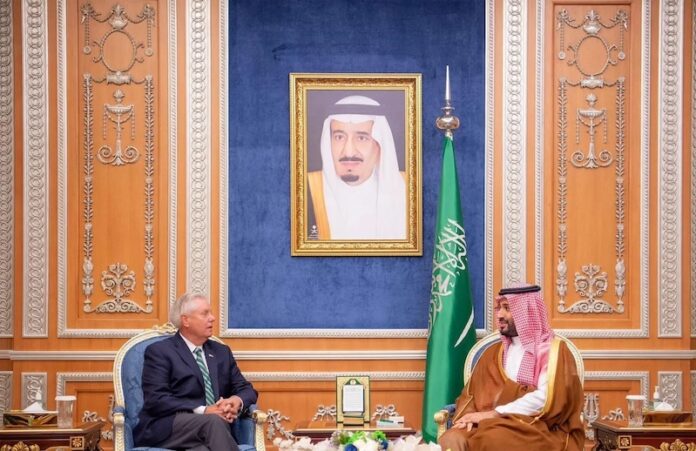America’s Strategy in the Israel-Palestine Conflict: Saudi Arabia’s Role
The United States has increasingly relied on Saudi Arabia and the UAE to manage the aftermath of the Israel-Palestine conflict. Brett McGurk, the White House Coordinator for the Middle East, emphasized that the U.S. seeks partnerships with these authoritarian regimes. McGurk’s approach focuses on regional control rather than addressing the core Palestinian grievances. He stated, “The United States is unique in its ability to guarantee Israel’s security.” This reveals the U.S. priority in preserving Israeli interests over Palestinian self-determination, reflecting the growing imbalance of power.
The Demise of the Two-State Solution: U.S. Policy Shift
Senator Lindsey Graham made it clear that the two-state solution is no longer considered a viable path to peace. He attributed this to Israel’s actions and the October 7 Hamas attack, which further diminished hopes for Palestinian sovereignty. “The two-state solution… has been dead ever since the cross-border assault by Hamas,” Graham declared. This marks a significant policy shift, with the U.S. now focused on securing Israel while disregarding Palestinian autonomy. The sidelining of Palestinian aspirations has become an integral part of American foreign policy in the region.
Gulf Monarchies as Gaza’s Guardians
Saudi Arabia and the UAE, under U.S. guidance, have been tasked with overseeing the reconstruction and governance of Gaza. Senator Lindsey Graham believes that Gulf leaders, Mohammed bin Salman and Sheikh Mohammed bin Zayed, will “create an enclave in Palestine.” However, these regimes have historically shown minimal interest in genuinely supporting Palestinian self-rule. The U.S. appears more focused on controlling Gaza than empowering its people with true sovereignty. This strategy only serves to entrench external influence over Gaza, making it more of a geopolitical pawn than an independent entity.
The Dangers of Saudi-UAE Leadership in Gaza: Insurgency and Unrest
Imposing external governance from Saudi Arabia and the UAE onto Gaza risks deepening instability rather than fostering peace. Palestinians, having a long history of resisting foreign control, will likely view this strategy as an extension of occupation. Senator Graham himself acknowledged the potential for renewed violence, stating, “If you don’t have a plan for the day after, Hamas will come back… Hezbollah will regenerate.” This highlights how U.S. strategies fail to address the core issues driving the conflict, favoring temporary control over long-term solutions. Resistance will likely continue under such misguided policies.
The Broader Failure of U.S. Foreign Policy in the Middle East
The U.S. reliance on Saudi Arabia and the UAE to manage the Israel-Palestine conflict exemplifies a deeper flaw in American foreign policy. Washington’s approach overlooks Palestinian sovereignty and focuses on maintaining power dynamics that benefit Israel. By aligning with Gulf monarchies, the U.S. further distances itself from addressing the needs of the Palestinian population. This strategy reveals the inherent imbalance in U.S. Middle East policy, which continually prioritizes Israeli security over addressing the root causes of regional instability. As long as these dynamics persist, genuine peace will remain elusive.
U.S. Policy Sacrifices Palestinian Rights for Israeli Security
American strategy in the Israel-Palestine conflict demonstrates a clear prioritization of Israeli security at the expense of Palestinian rights. The U.S. has enlisted Saudi Arabia and the UAE to maintain control over Gaza, undermining Palestinian autonomy. Gulf monarchies, more concerned with regional power than with Palestinian interests, only reinforce the status quo. As U.S. policy continues to favor external control over Palestinian self-governance, the region remains trapped in a cycle of instability. This ongoing imbalance perpetuates conflict rather than providing any real path to peace for Palestinians.

